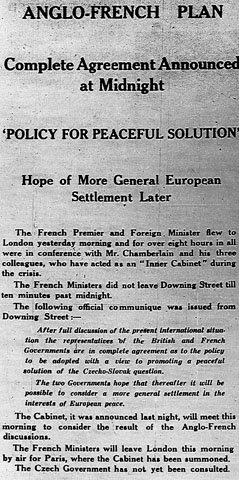
Another week of crisis begins. How much longer can this go on? The most significant news from the weekend concerns another round of shuttle diplomacy — this time it’s the French Premier, Édouard Daladier, and Foreign Minister, Georges Bonnet, who have flown to London to consult with their British counterparts. The official communique, which can be read above (Manchester Guardian, p. 11) is pretty bland and just says that France and Britain are in complete agreement as to their policy over Czechoslovakia, without saying just what that is. But the Manchester Guardian‘s diplomatic correspondent has some more information. It seems that they are cooling on the idea of a plebiscite of the Sudeten people to see what they want to do, and warming to the idea of ceding at least part of the Sudetenland to Germany. Of course, the Czech government hasn’t been consulted at this stage. No decision has been made on the question of an international guarantee of Czechoslovakian guarantee after a settlement. Henlein, in exile in Germany, has called for his followers to take arms and rebel against their Czech oppressors, but (perhaps surprisingly) they seem to have ignored him (p. 14).
The other big piece of news is that Mussolini has referred to the Czech crisis in a speech given at Trieste (itself a contested area). According to the headline in the Guardian, he declared that Italy will be ‘Beside Germany in a Major Conflict’, but that seems to be a (no doubt logical) inference. Mussolini is reported to have said that
When the problems raised by history have reached a stage of tormented complication, the solution which imposes itself is the simplest, the most logical, the most radical — that which we Fascists call totalitarian.
This sounds rather bellicose, except that he went on to say that ‘the solution has only one name — plebiscites’. He praised Chamberlain as ‘a flying messenger of peace’ and hopes that a peaceful solution will be found:
But if this does not happen and were to end in a ranging of forces for or against Prague, let it be known that Italy’s position is already chosen.
This is a fairly-well veiled threat, it seems to me. Mussolini also said that Moscow was behind attempts to denigrate the plebiscite solution, and Moscow has indeed come out and publicly denounced Chamberlain’s efforts for peace (p. 14). According to Pravda, Chamberlain’s foreign policy is always to make a deal with an aggressor. ‘The purpose of his German visit was a bargain for which Czecho-Slovakia would be force to pay’, and anyway will only bring war closer, not prevent it.
The question of war or peace is certainly on everyone’s minds. According to the Manchester Guardian‘s London correspondent (p. 10), ‘The streets are beginning to take on an unpleasant resemblance to the end of July, 1914’. Examining the faces of the crowds waiting and watching at Downing Street, it was thought that they ‘expressed anxiety, and people don’t talk much to one another as waiting folk usually do at moments of political crisis’. The leading article, on the same page, begins:
It seems likely that this week we shall reach the turning-point between peace and the dreadful catastrophe of war, and as the hours pass we can only trust that it will still prove possible to preserve the peace and to preserve it with credit to ourselves.
It’s that last bit — ‘with credit to ourselves’ — which worries the left. Last night, thousands of ‘demonstrators’ marched up and down Whitehall shouting ‘Stand by the Czechs’ (Manchester Guardian, p. 5). Police had to bar entrance to Downing Street and then clear Whitehall itself of pedestrians: ‘It is many years since Whitehall was thus closed to pedestrian traffic’. Three people were arrested. The demonstration formed in Trafalgar Square, and seems to have organised by the International Peace Campaign. Despite its name, it does seem to want Chamberlain to use military force, if necessary, to prevent Germany from violently dismembering Czechoslovakia. ‘Red Ellen’ Wilkinson, a fiery Labour MP who had organised the Jarrow hunger march in 1936, told the crowd:
We say to Neville Chamberlain: We don’t trust you. We believe that you went to Germany to fix up a sale of the liberties of Czecho-Slovakia.
Also speaking that night, but over in Limehouse, was Clement Attlee, leader of the Labour Party (Manchester Guardian, p. 5). He spoke in similar vein to Wilkinson, though much more measured. But he attracted a demonstration of his own — a fascist one:
[…] a crowd of over five hundred assembled on the pavement outside the hall and shouted “We want peace, Attlee wants war.” Mounted police arrived and broke up the crowd, most of which had come from a Fascist meeting held earlier in one of the side streets.
There’s a hopeful piece on pp. 11 and 12 of the Guardian (it’s a good issue today!). It’s entitled ‘Air power in war-time’ and is by Major Frederic Arthur de Vere Robertson (about whom I know next to nothing, so if anybody can enlighten me, I’d be grateful). Given the war fears and all the ARP preparations going on, it’s not so surprising to see an article on this topic, but it is surprising that it is so sceptical of the power of the bomber. He opens by saying that a former senior RAF officer had told him that his fighters aimed to inflict 100% wastage on enemy raiders over three weeks, a rate of loss which they could not possibly sustain.
Since those words were uttered the defences of Great Britain have grown immeasurably stronger, and though for a time the technical improvement of bombers in speed outstripped the improvement in fighters, the advent of the Hurricane and the Spitfire, each mounting eight machine-guns and each with a top speed of at least 340 m.p.h., has reversed the process.
He also notes that the theory of the knock-out blow — that the bomber can smash civilian morale and thus force capitulation — is ‘a theory unsupported by the facts of history and least of all by the results of bombing cities in Spain and China’. This correlates with a general rise in scepticism of the knock-out blow at this time among airpower experts, but whether this new thinking will have much effect on popular beliefs remains to be seen.
That’s all pretty heavy going; here are a couple of lighter bits to end with. The first is a ‘day in the life’ piece on Chamberlain, from the Daily Mail (p. 12). It’s very sympathetic (the leading article on the same page is, after all, entitled ‘TRUST CHAMBERLAIN’) and portrays him as a strong and decisive leader, on top of the situation, etc. More unexpected is the emphasis on his interest in natural history (he’s a bit of a twitcher), his sense of humour, his intellectual interests (Shakespeare, art). But mainly I wanted to point out the accompanying photo:
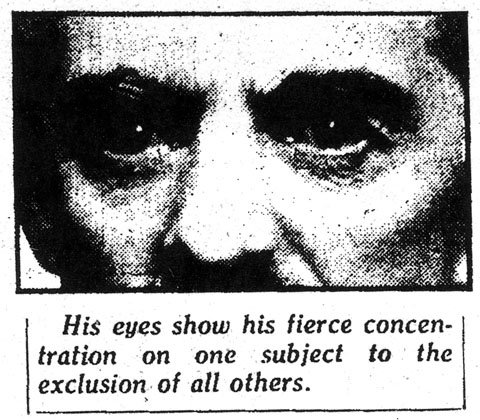
Is it just me, or could you equally plausibly caption that photo ‘WOULD YOU TRUST THIS MAN TO NEGOTIATE WITH HITLER ON YOUR BEHALF — AND YOUR FAMILY’S?’ Or even ‘ARE THESE THE EYES OF A SERIAL KILLER?’ Well, possibly that one is going too far.
Finally, here’s Herbert Morrison, Labour MP and leader of the London County Council, speaking in London last night — evidently his audience were a bit glum over the continuing crisis:
Cheer up. I know it is not easy, particularly for me who knows more than most of you what the position is.
Yeah, I’m sure that did the trick!
![]() This work is licensed under a Creative Commons Attribution-NonCommercial-NoDerivatives 4.0 International License.
Permissions beyond the scope of this license may be available at http://airminded.org/copyright/.
This work is licensed under a Creative Commons Attribution-NonCommercial-NoDerivatives 4.0 International License.
Permissions beyond the scope of this license may be available at http://airminded.org/copyright/.

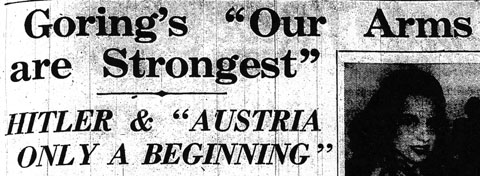
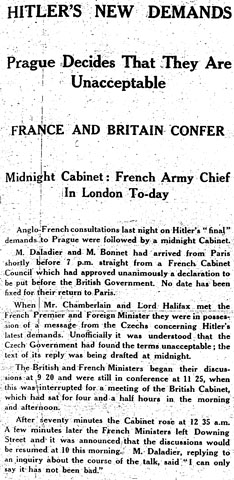
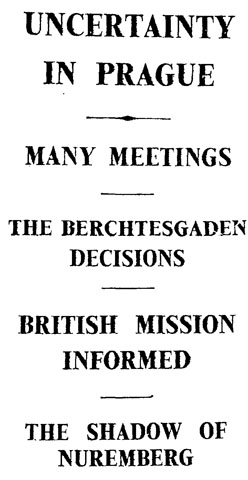
Major De V. R. is the militay correspondent for _Flight_, which normally takes a very skeptical view of things like gas bombs and knockout blows. _The Aeroplane’s_ editorial position is more radical, but its military correspondent (C. M. McAleery) less so. I’ve never seen R.’s journalism elsewhere, but then I haven’t been looking that hard.
Pingback: Airminded · Tuesday, 20 September 1938
Yes, he wrote fairly regularly for the Manchester Guardian too, at least between 1938 and 1940. But what’s his background? I’m guessing ex-RFC, because of the ‘Major’, though it doesn’t preclude him from having continued in the RAF as well.
Pingback: Airminded · Post-blogging the Sudeten crisis: thoughts and conclusions